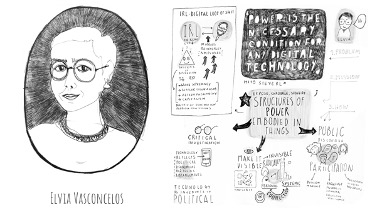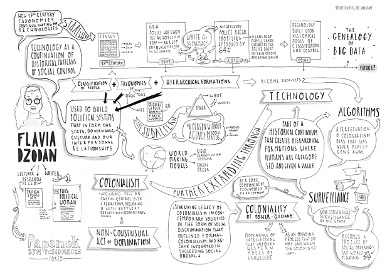
Published by
Liverpool Biennial in partnership with DATA browser series.
ISSN: 2399-9675
Editor:
Joasia Krysa, Manuela Moscoso
Editorial Assistant:
Abi Mitchell
Copyeditor:
Melissa Larner
Web Design:
Mark El-Khatib
Cover Design:
Manuela Moscoso (artwork), Joasia Krysa (words), Helena Geilinger (graphic design)
A Visual Introduction To AI
Elvia Vasconcelos
Download this article as PDF
Elvia Vasconcelos

Figure 1. Self-portrait sketch
Elvia Vasconcelos is a design researcher, wannabe activist, compulsive drawer and dressmaker. She is currently a doctoral candidate at the Technical University of Eindhoven, where she is investigating the politics of participation and accessibility. This research takes the notion of participation as ‘being together’ and explores what being together means in struggle, through a praxis that creates spaces for a multitude of voices and bodies to speak and be heard.
Vasconcelos’s design practice deals with the socio-political dimensions of digital technologies. Taking voice technologies as an object to critically explore the field of Artificial Intelligence, she created the ‘Feminist Alexa’ project in 2017 – a series of workshops that critically look at Personal Intelligent Assistants e.g. Amazon Alexa, to investigate the ways in which gender is used in technology and the connections to gender-based discrimination in real life. Her critical investigations of AI have been articulated in a number of different settings such as in Alexa Diaries, in the Feminist Voices in Tecnology publication and at a number of events such as the Mozilla Festival, The air of turbulence and Primer Conference.
In her critical investigation of AI Vasconcelos has used sketching as a way to render complexity more accessible.

Figure 2. Sketches in collaboration with Virginia Eubanks on the ‘Automating Inequality’ book
The visual mapping of insight allows us to see and make connections that could not be seen before. This is enabled by putting things together side by side, which in a way facilitates drawn things to exchange between themselves, and this in turn triggers further dialogue between people. In other words, through visual representation we are able to explore the overlaps, connections and shared meanings that we would not be able to access otherwise.
Recent works include collaborations with Virginia Eubanks, author of the Automating Inequality book; the Datafeminism reading group; the illustration school; Superflux amongst others.

Figure 3. Flavia Dzodan at Papanek Symposium 2019
- Editorial: Curating, Biennials, and Artificial Intelligence
Joasia Krysa and Manuela Moscoso - Towards a Poetics Of Artificial Superintelligence: How Symbolic Language Can Help Us Grasp The Nature and Power of What is Coming
Nora N. Khan - MI3 (Machine Intelligence 3)
Suzanne Treister - A Visual Introduction To AI
Elvia Vasconcelos - Excavating AI: The Politics of Images in Machine Learning Training Sets
Kate Crawford and Trevor Paglen - Notes On A (Dis)continuous Surface
Murad Khan - Irresolvable Contradictions in Algorithmic Thought
Leonardo Impett - Creative AI Lab: The Back-End Environments of Art-Making
Eva Jäger - Creative AI Database
Serpentine R&D Platform & Kings College London - Research & Development at the Art Institution
Victoria Ivanova and Ben Vickers - Future Art Ecosystems (FAE): Strategies for an Art-Industrial Revolution
Serpentine R&D Platform & Rival Strategy - Curating Data: Infrastructures of Control and Affect … and Possible Beyonds
Magda Tyzlik-Carver - The Next Biennial Should be Curated by a Machine - A Research Proposition
Joasia Krysa and Leonardo Impett - Glossary